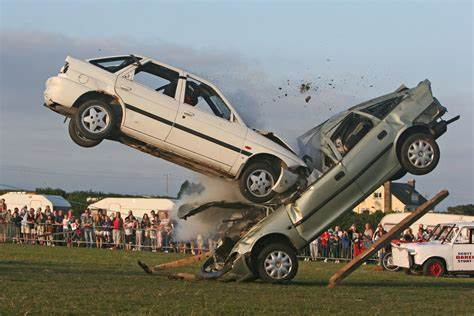Harry Bingham of Jericho Writers had some interesting thoughts in his email of a couple of weeks ago.
He said, “Let’s talk car crashes.”
“What if you have a writing car crash? A complete and total failure?
And, by the way, we need to be a bit careful to define terms here. If you’re writing your first novel and you make some plotting cock-ups, that’s not a failure – that’s just writing.
If you complete your work, edit it hard, then come to us for a manuscript assessment, only to be told that there are still a lot of issues, that too is not a failure. It’s just writing.
Same thing, indeed, if you go through the whole process, and send your stuff out to agents, and get some agents wanting to see the full manuscript only, ultimately, to say no. That’s disappointing, of course, but really, that’s a success. You wrote your very first novel and got it good enough, on that first outing, to have serious agents toying with the idea of taking you on? How is that not impressive?
So, yes, I have high standards for what constitutes a car crash. I think the key ingredients are (A) your work is way below the standard to be expected from someone of your experience – plus, (B) you’re completely in the dark about how bad things are. If you have the first element without the second, you don’t have a car-crash, you just have an unresolved editorial problem, and we all have those. Again: that’s just writing.
But, even on a strict definition, I had a total car crash early in my career – my only really bad experience.
I’d already sold my first book, via a highly contested auction, and the book went on to be a bestseller. So: good outcome, right?
Better still, I’d delivered the draft of my second book before the first was even launched. So: good author, right?
The trouble was that second book was AWFUL. I haven’t kept a draft of it and never re-read it, so I now only have a nightmare-style recall of what was in it. But – plotting, bad. Elevator pitch – worse. Writing – subpar. Characters – patchy and (yeugh) a bit icky too.
The draft was so bad that I got called into HarperCollins’ nice London offices for an editorial discussion. My editor and publisher, both very nice humans, told me – gently – how bad the book was.
I didn’t need a lot of telling. I wasn’t defensive. As soon as they started to talk it through, I realised they were right. Luckily, I had plenty of time to do a re-write. So I got home, copied the document into a Drafts folder that I could plunder for paragraphs here and there, then selected the whole document and hit delete.
This bestselling author had just deleted his second novel.
My redraft was about a million times better than the version before, and it was still the least good thing I’ve ever written. But it’s also where I really learned to be a writer. My first novel had just come too easily. The core idea had been a good one. My delivery was fine, or more than fine. But the absence of struggle had also meant an absence of knowhow. I’d read nothing at all about the craft of writing. It hadn’t occurred to me that I might need to do so. (We all know how to write, no? You just glue enough sentences together.)
That second novel was a wrestling match, start to finish. I read every book I could find on craft. I didn’t agree with everything I read, but even the process of disagreeing made me more reflective, more considered.
And that second book didn’t do badly. I got a sort-of film deal for it, which admittedly never quite materialised. The book was shortlisted for one of the big annual writing prizes. It sold a plump five-figures number of copies.
I still don’t love the book, but it did OK.
My reasons for offering you this story is threefold:
1. Car crashes happen
They’re not terminal. Don’t fret. Move on.
2. Use them to learn
I’m a huge believer in the importance of craft.
Writing technique is the sword and shield that protects you from disaster. It won’t protect you from mistakes – nothing does. But the better your basic writing craft, the quicker you’ll pick those issues up and the more rapidly you’ll solve them.
3. Protect yourself
The best way to avoid major problems, however, is to stop making them in the first place. The single strongest tool you have for doing that is a powerful idea for your book. The stronger that idea, the better your delivery is likely to be – and the less any errors of execution are likely to matter. Dan Brown is the ultimate exemplar here. He is a poor writer – but his Da Vinci Code idea was (for his particular market niche) one of genius. You could, I guess, say the same about EL James and Shades of Grey, except that her writing is even worse.
The reason I called my own personal car-crash a worst-best experience is because it made me a far better writer. It was the single biggest learning development of my writing life.
My first book was gifted to me. The rest? They were all worked for. And if I’m technically competent now, that’s largely because of the kick in the pants I got from that terrible second novel of mine.”
